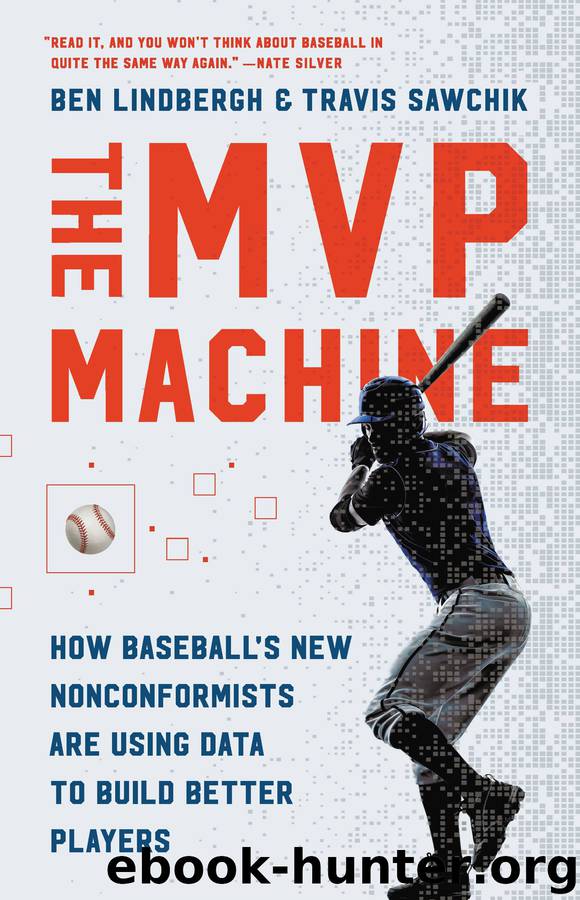The MVP Machine by Ben Lindbergh

Author:Ben Lindbergh
Language: eng
Format: epub
Publisher: Basic Books
Published: 2019-06-03T16:00:00+00:00
When Steinhorn says that “there’s no separateness” between the Astros’ front office and field staff and that “there’s always conversation” between the two, he’s describing a setup dramatically different from the way player development has historically worked.
In the past, “you ha[d] these silos,” says former Padres analyst Chris Long. “Player development, those guys are working on players in completely different cities and states.… They’re part of the organization, but they’re going to be a thousand miles away from you. So the interaction was minimal.” That geographical divide produced an informational and philosophical fracture. “We had no idea what the training regimens were for the players,” Long says. “It was completely offline.… All that stuff was just completely inaccessible unless you visited [the team] or called the guys and hassled them.”
Technology has reduced that divide. Thanks to TrackMan and rapid video transmission, the front office can monitor its minor leaguers’ performance virtually in real time. What’s more, the whole staff is accessible via the workplace-communication software Slack, and the development coaches and performance apprentices—a new position focused on strength and conditioning that the team put in place for 2019—provide plenty of points of contact. In 2017, the Astros front office went one step further than communicating with coaches: Mejdal became a coach, spending the summer in short-season A-ball with the Tri-City ValleyCats, who didn’t yet have a development coach. “A part of me going there was for the front office in general to become a bit smarter about the constraints of minor-league ball,” Mejdal says. “It’s easy for us to imagine ways of improving it, and sometimes the ideas are great. Other times they fall flat on their face, and we weren’t very good at predicting which way some of these ideas were going to go.”
Mejdal wasn’t confident that he could predict how this idea was going to go, either; he hadn’t worn a uniform since Little League, and while he was capable of throwing BP, even deliberately practicing his fungo-hitting skills improved them only from “godawful to really bad.” As Mejdal recalls, “There was initially an anxiety of how the players were going to perceive me.… Like, ‘Shit, we could have a real coach, but instead we have this guy from NASA. Thanks a lot, Astros.’”
Johnson, who pitched for Tri-City, confesses to some skepticism on the part of the players, saying, “At first we were wondering what he was doing here… is he up to something?” But both Mejdal and Johnson say that Mejdal soon settled in and became almost indistinguishable from a regular staffer, coaching first base and spending time with the players at meals and on the bus. He emphasized the importance of pitching ahead in the count, worked with hitters on using swing sensors, and always had his laptop on hand to dig up data and present it to the players in a digestible way.
Mejdal’s minor-league odyssey is symbolic of the centrality of player development to every other initiative in the post-Moneyball era. For the all-in Astros, development is everything, and everything is development.
Download
This site does not store any files on its server. We only index and link to content provided by other sites. Please contact the content providers to delete copyright contents if any and email us, we'll remove relevant links or contents immediately.
Unstoppable by Maria Sharapova(3126)
The Inner Game of Tennis by W. Timothy Gallwey(3015)
Urban Outlaw by Magnus Walker(2958)
Crazy Is My Superpower by A.J. Mendez Brooks(2877)
The Social Psychology of Inequality by Unknown(2329)
The Fight by Norman Mailer(2166)
Unstoppable: My Life So Far by Maria Sharapova(2135)
Going Long by Editors of Runner's World(1928)
Accepted by Pat Patterson(1924)
Motorcycle Man by Kristen Ashley(1873)
The Happy Runner by David Roche(1835)
The Sports Gene: Inside the Science of Extraordinary Athletic Performance by David Epstein(1830)
Backpacker the Complete Guide to Backpacking by Backpacker Magazine(1827)
Futebol by Alex Bellos(1810)
Sea Survival Handbook by Keith Colwell(1801)
Mind Fuck by Manna Francis(1758)
Peak: Secrets from the New Science of Expertise by Anders Ericsson & Robert Pool(1674)
Endure by Alex Hutchinson(1619)
The Call of Everest by Conrad Anker(1556)
